

How to Write a Book Report
Use the links below to jump directly to any section of this guide:
Book Report Fundamentals
Preparing to write, an overview of the book report format, how to write the main body of a book report, how to write a conclusion to a book report, reading comprehension and book reports, book report resources for teachers .
Book reports remain a key educational assessment tool from elementary school through college. Sitting down to close read and critique texts for their content and form is a lifelong skill, one that benefits all of us well beyond our school years. With the help of this guide, you’ll develop your reading comprehension and note-taking skills. You’ll also find resources to guide you through the process of writing a book report, step-by-step, from choosing a book and reading actively to revising your work. Resources for teachers are also included, from creative assignment ideas to sample rubrics.
Book reports follow general rules for composition, yet are distinct from other types of writing assignments. Central to book reports are plot summaries, analyses of characters and themes, and concluding opinions. This format differs from an argumentative essay or critical research paper, in which impartiality and objectivity is encouraged. Differences also exist between book reports and book reviews, who do not share the same intent and audience. Here, you’ll learn the basics of what a book report is and is not.
What Is a Book Report?
"Book Report" ( ThoughtCo )
This article, written by a professor emeritus of rhetoric and English, describes the defining characteristics of book reports and offers observations on how they are composed.
"Writing a Book Report" (Purdue OWL)
Purdue’s Online Writing Lab outlines the steps in writing a book report, from keeping track of major characters as you read to providing adequate summary material.
"How to Write a Book Report" ( Your Dictionary )
This article provides another helpful guide to writing a book report, offering suggestions on taking notes and writing an outline before drafting.
"How to Write a Successful Book Report" ( ThoughtCo )
Another post from ThoughtCo., this article highlights the ten steps for book report success. It was written by an academic advisor and college enrollment counselor.
What’s the Difference Between a Book Report and an Essay?
"Differences Between a Book Report & Essay Writing" ( Classroom)
In this article from the education resource Classroom, you'll learn the differences and similarities between book reports and essay writing.
"Differences Between a Book Report and Essay Writing" (SeattlePi.com)
In this post from a Seattle newspaper's website, memoirist Christopher Cascio highlights how book report and essay writing differ.
"The Difference Between Essays and Reports" (Solent Online Learning)
This PDF from Southampton Solent University includes a chart demonstrating the differences between essays and reports. Though it is geared toward university students, it will help students of all levels understand the differing purposes of reports and analytical essays.
What’s the Difference Between a Book Report and a Book Review?
"How to Write a Book Review and a Book Report" (Concordia Univ.)
The library at Concordia University offers this helpful guide to writing book report and book reviews. It defines differences between the two, then presents components that both forms share.
"Book Reviews" (Univ. of North Carolina)
The University of North Carolina at Chapel Hill’s writing guide shows the step-by-step process of writing book reviews, offering a contrast to the composition of book reports.
Active reading and thoughtful preparation before you begin your book report are necessary components of crafting a successful piece of writing. Here, you’ll find tips and resources to help you learn how to select the right book, decide which format is best for your report, and outline your main points.
Selecting and Finding a Book
"30 Best Books for Elementary Readers" (Education.com)
This article from Education.com lists 30 engaging books for students from kindergarten through fifth grade. It was written by Esme Raji Codell, a teacher, author, and children's literature specialist.
"How to Choose a Good Book for a Report (Middle School)" (WikiHow)
This WikiHow article offers suggestions for middle schoolers on how to choose the right book for a report, from getting started early on the search process to making sure you understand the assignment's requirements.
"Best Book-Report Books for Middle Schoolers" (Common Sense Media)
Common Sense Media has compiled this list of 25 of the best books for middle school book reports. For younger students, the article suggests you check out the site's "50 Books All Kids Should Read Before They're 12."
"50 Books to Read in High School" (Lexington Public Library)
The Lexington, Kentucky Public Library has prepared this list to inspire high school students to choose the right book. It includes both classics and more modern favorites.
The Online Computer Library Center's catalogue helps you locate books in libraries near you, having itemized the collections of 72,000 libraries in 170 countries.
Formats of Book Reports
"Format for Writing a Book Report" ( Your Dictionary )
Here, Your Dictionary supplies guidelines for the basic book report format. It describes what you'll want to include in the heading, and what information to include in the introductory paragraph. Be sure to check these guidelines against your teacher's requirements.
"The Good Old Book Report" (Scholastic)
Nancy Barile’s blog post for Scholastic lists the questions students from middle through high school should address in their book reports.
How to Write an Outline
"Writer’s Web: Creating Outlines" (Univ. of Richmond)
The University of Richmond’s Writing Center shows how you can make use of micro and macro outlines to organize your argument.
"Why and How to Create a Useful Outline" (Purdue OWL)
Purdue’s Online Writing Lab demonstrates how outlines can help you organize your report, then teaches you how to create outlines.
"Creating an Outline" (EasyBib)
EasyBib, a website that generates bibliographies, offers sample outlines and tips for creating your own. The article encourages you to think about transitions and grouping your notes.
"How to Write an Outline: 4 Ways to Organize Your Thoughts" (Grammarly)
This blog post from a professional writer explains the advantages of using an outline, and presents different ways to gather your thoughts before writing.
In this section, you’ll find resources that offer an overview of how to write a book report, including first steps in preparing the introduction. A good book report's introduction hooks the reader with strong opening sentences and provides a preview of where the report is going.
"Step-by-Step Outline for a Book Report" ( Classroom )
This article from Classroom furnishes students with a guide to the stages of writing a book report, from writing the rough draft to revising.
"Your Roadmap to a Better Book Report" ( Time4Writing )
Time4Writing offers tips for outlining your book report, and describes all of the information that the introduction, body, and conclusion should include.
"How to Start a Book Report" ( ThoughtCo)
This ThoughtCo. post, another by academic advisor and college enrollment counselor Grace Fleming, demonstrates how to write a pithy introduction to your book report.
"How to Write an Introduction for a Book Report" ( Classroom )
This brief but helpful post from Classroom details what makes a good book report introduction, down to the level of individual sentences.
The body paragraphs of your book report accomplish several goals: they describe the plot, delve more deeply into the characters and themes that make the book unique, and include quotations and examples from the book. Below are some resources to help you succeed in summarizing and analyzing your chosen text.
Plot Summary and Description
"How Do You Write a Plot Summary?" ( Reference )
This short article presents the goals of writing a plot summary, and suggests a word limit. It emphasizes that you should stick to the main points and avoid including too many specific details, such as what a particular character wears.
"How to Write a Plot for a Book Report" ( The Pen & The Pad )
In this article from a resource website for writers, Patricia Harrelson outlines what information to include in a plot summary for a book report.
"How to Write a Book Summary" (WikiHow)
Using Harry Potter and the Sorcerer’s Stone as an example, this WikiHow article demonstrates how to write a plot summary one step at a time.
Analyzing Characters and Themes
"How to Write a Character Analysis Book Report" ( The Pen & The Pad )
Kristine Tucker shows how to write a book report focusing on character. You can take her suggestions as they are, or consider incorporating them into the more traditional book report format.
"How to Write a Character Analysis" (YouTube)
The SixMinuteScholar Channel utilizes analysis of the film Finding Nemo to show you how to delve deeply into character, prioritizing inference over judgment.
"How to Define Theme" ( The Editor's Blog )
Fiction editor Beth Hill contributes an extended definition of theme. She also provides examples of common themes, such as "life is fragile."
"How to Find the Theme of a Book or Short Story" ( ThoughtCo )
This blog post from ThoughtCo. clarifies the definition of theme in relation to symbolism, plot, and moral. It also offers examples of themes in literature, such as love, death, and good vs. evil.
Selecting and Integrating Quotations
"How to Choose and Use Quotations" (Santa Barbara City College)
This guide from a college writing center will help you choose which quotations to use in your book report, and how to blend quotations with your own words.
"Guidelines for Incorporating Quotes" (Ashford Univ.)
This PDF from Ashford University's Writing Center introduces the ICE method for incorporating quotations: introduce, cite, explain.
"Quote Integration" (YouTube)
This video from The Write Way YouTube channel illustrates how to integrate quotations into writing, and also explains how to cite those quotations.
"Using Literary Quotations" (Univ. of Wisconsin-Madison)
This guide from the University of Wisconsin-Madison’s Writing Center helps you emphasize your analysis of a quotation, and explains how to incorporate quotations into your text.
Conclusions to any type of paper are notoriously tricky to write. Here, you’ll learn some creative ways to tie up loose ends in your report and express your own opinion of the book you read. This open space for sharing opinions that are not grounded in critical research is an element that often distinguishes book reports from other types of writing.
"How to Write a Conclusion for a Book Report" ( Classroom )
This brief article from the education resource Classroom illustrates the essential points you should make in a book report conclusion.
"Conclusions" (Univ. of North Carolina)
The University of North Carolina at Chapel Hill’s Writing Center lays out strategies for writing effective conclusions. Though the article is geared toward analytical essay conclusions, the tips offered here will also help you write a strong book report.
"Ending the Essay: Conclusions" (Harvard College Writing Center)
Pat Bellanca’s article for Harvard University’s Writing Center presents ways to conclude essays, along with tips. Again, these are suggestions for concluding analytical essays that can also be used to tie up a book report's loose ends.
Reading closely and in an engaged manner is the strong foundation upon which all good book reports are built. The resources below will give you a picture of what active reading looks like, and offer strategies to assess and improve your reading comprehension. Further, you’ll learn how to take notes—or “annotate” your text—making it easier to find important information as you write.
How to Be an Active Reader
"Active Reading Strategies: Remember and Analyze What You Read" (Princeton Univ.)
Princeton University’s McGraw Center for Teaching and Learning recommends ten strategies for active reading, and includes sample diagrams.
"Active Reading" (Open Univ.)
The Open University offers these techniques for reading actively alongside video examples. The author emphasizes that you should read for comprehension—not simply to finish the book as quickly as possible.
"7 Active Reading Strategies for Students" ( ThoughtCo )
In this post, Grace Fleming outlines seven methods for active reading. Her suggestions include identifying unfamiliar words and finding the main idea.
"5 Active Reading Strategies for Textbook Assignments" (YouTube)
Thomas Frank’s seven-minute video demonstrates how you can retain the most important information from long and dense reading material.
Assessing Your Reading Comprehension
"Macmillan Readers Level Test" (MacMillan)
Take this online, interactive test from a publishing company to find out your reading level. You'll be asked a number of questions related to grammar and vocabulary.
"Reading Comprehension Practice Test" (ACCUPLACER)
ACCUPLACER is a placement test from The College Board. This 20-question practice test will help you see what information you retain after reading short passages.
"Reading Comprehension" ( English Maven )
The English Maven site has aggregated exercises and tests at various reading levels so you can quiz your reading comprehension skills.
How to Improve Your Reading Comprehension
"5 Tips for Improving Reading Comprehension" ( ThoughtCo )
ThoughtCo. recommends five tips to increase your reading comprehension ability, including reading with tools such as highlighters, and developing new vocabulary.
"How to Improve Reading Comprehension: 8 Expert Tips" (PrepScholar)
This blog post from PrepScholar provides ideas for improving your reading comprehension, from expanding your vocabulary to discussing texts with friends.
CrashCourse video: "Reading Assignments" (YouTube)
This CrashCourse video equips you with tools to read more effectively. It will help you determine how much material you need to read, and what strategies you can use to absorb what you read.
"Improving Reading Comprehension" ( Education Corner )
From a pre-reading survey through post-reading review, Education Corner walks you through steps to improve reading comprehension.
Methods of In-text Annotation
"The Writing Process: Annotating a Text" (Hunter College)
This article from Hunter College’s Rockowitz Writing Center outlines how to take notes on a text and provides samples of annotation.
"How To Annotate Text While Reading" (YouTube)
This video from the SchoolHabits YouTube channel presents eleven annotation techniques you can use for better reading comprehension.
"5 Ways To Annotate Your Books" ( Book Riot )
This article from the Book Riot blog highlights five efficient annotation methods that will save you time and protect your books from becoming cluttered with unnecessary markings.
"How Do You Annotate Your Books?" ( Epic Reads )
This post from Epic Reads highlights how different annotation methods work for different people, and showcases classic methods from sticky notes to keeping a reading notebook.
Students at every grade level can benefit from writing book reports, which sharpen critical reading skills. Here, we've aggregated sources to help you plan book report assignments and develop rubrics for written and oral book reports. You’ll also find alternative book report assessment ideas that move beyond the traditional formats.
Teaching Elementary School Students How to Write Book Reports
"Book Reports" ( Unique Teaching Resources )
These reading templates courtesy of Unique Teaching Resources make great visual aids for elementary school students writing their first book reports.
"Elementary Level Book Report Template" ( Teach Beside Me )
This printable book report template from a teacher-turned-homeschooler is simple, classic, and effective. It asks basic questions, such as "who are the main characters?" and "how did you feel about the main characters?"
"Book Reports" ( ABC Teach )
ABC Teach ’s resource directory includes printables for book reports on various subjects at different grade levels, such as a middle school biography book report form and a "retelling a story" elementary book report template.
"Reading Worksheets" ( Busy Teacher's Cafe )
This page from Busy Teachers’ Cafe contains book report templates alongside reading comprehension and other language arts worksheets.
Teaching Middle School and High School Students How to Write Book Reports
"How to Write a Book Report: Middle and High School Level" ( Fact Monster)
Fact Monster ’s Homework Center discusses each section of a book report, and explains how to evaluate and analyze books based on genre for students in middle and high school.
"Middle School Outline Template for Book Report" (Trinity Catholic School)
This PDF outline template breaks the book report down into manageable sections for seventh and eighth graders by asking for specific information in each paragraph.
"Forms for Writing a Book Report for High School" ( Classroom )
In this article for Classroom, Elizabeth Thomas describes what content high schoolers should focus on when writing their book reports.
"Forms for Writing a Book Report for High School" ( The Pen & The Pad )
Kori Morgan outlines techniques for adapting the book report assignment to the high school level in this post for The Pen & The Pad .
"High School Book Lists and Report Guidelines" (Highland Hall Waldorf School)
These sample report formats, grading paradigms, and tips are collected by Highland Hall Waldorf School. Attached are book lists by high school grade level.
Sample Rubrics
"Book Review Rubric Editable" (Teachers Pay Teachers)
This free resource from Teachers Pay Teachers allows you to edit your book report rubric to the specifications of your assignment and the grade level you teach.
"Book Review Rubric" (Winton Woods)
This PDF rubric from a city school district includes directions to take the assignment long-term, with follow-up exercises through school quarters.
"Multimedia Book Report Rubric" ( Midlink Magazine )
Perfect for oral book reports, this PDF rubric from North Carolina State University's Midlink Magazine will help you evaluate your students’ spoken presentations.
Creative Book Report Assignments
"25 Book Report Alternatives" (Scholastic)
This article from the Scholastic website lists creative alternatives to the standard book report for pre-kindergarteners through high schoolers.
"Fresh Ideas for Creative Book Reports" ( Education World )
Education World offers nearly 50 alternative book report ideas in this article, from a book report sandwich to a character trait diagram.
"A Dozen Ways to Make Amazingly Creative Book Reports" ( We Are Teachers )
This post from We Are Teachers puts the spotlight on integrating visual arts into literary study through multimedia book report ideas.
"More Ideas Than You’ll Ever Use for Book Reports" (Teachnet.com)
This list from Teachnet.com includes over 300 ideas for book report assignments, from "interviewing" a character to preparing a travel brochure to the location in which the book is set.
"Fifty Alternatives to the Book Report" (National Council of Teachers of English)
In this PDF resource from the NCTE's English Journal, Diana Mitchell offers assignment ideas ranging from character astrology signs to a character alphabet.
- PDFs for all 136 Lit Terms we cover
- Downloads of 1924 LitCharts Lit Guides
- Teacher Editions for every Lit Guide
- Explanations and citation info for 40,556 quotes across 1924 books
- Downloadable (PDF) line-by-line translations of every Shakespeare play
Need something? Request a new guide .
How can we improve? Share feedback .
LitCharts is hiring!

- Try for free
Book Report Packet for Middle School
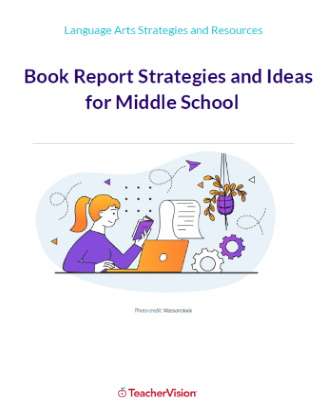
Tips and tools for how to write a book report
Use the 4 strategies and 2 resources in this packet to help your middle school students get more out of their reading and write better book reports. These strategies can be applied to any work of fiction, and the editable worksheets focus on collecting and organizing the most important plot and character information.
- 4 strategies with tips on how to put them into practice
- An editable plot sequencing printable for gathering and documenting important plot points
- An editable character study printable for summarizing character information by chapter
- A generic rubric for grading and assessing book study projects like book reports.
Some of the strategies featured include:
Create an alternate book cover, plot sequencing.

Featured Middle School Resources
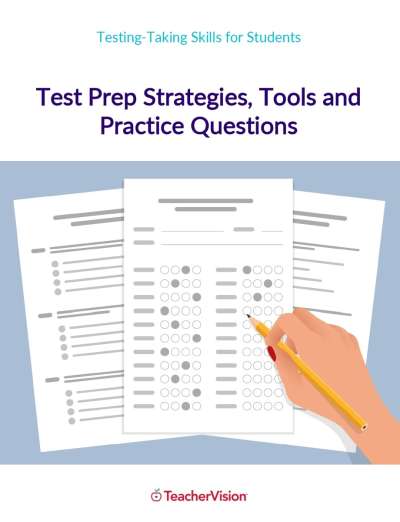
Related Resources

About the author

Contributor
About stephanie.

- My Storyboards
Book Report Planning Sheets
Customize book report planning sheets.
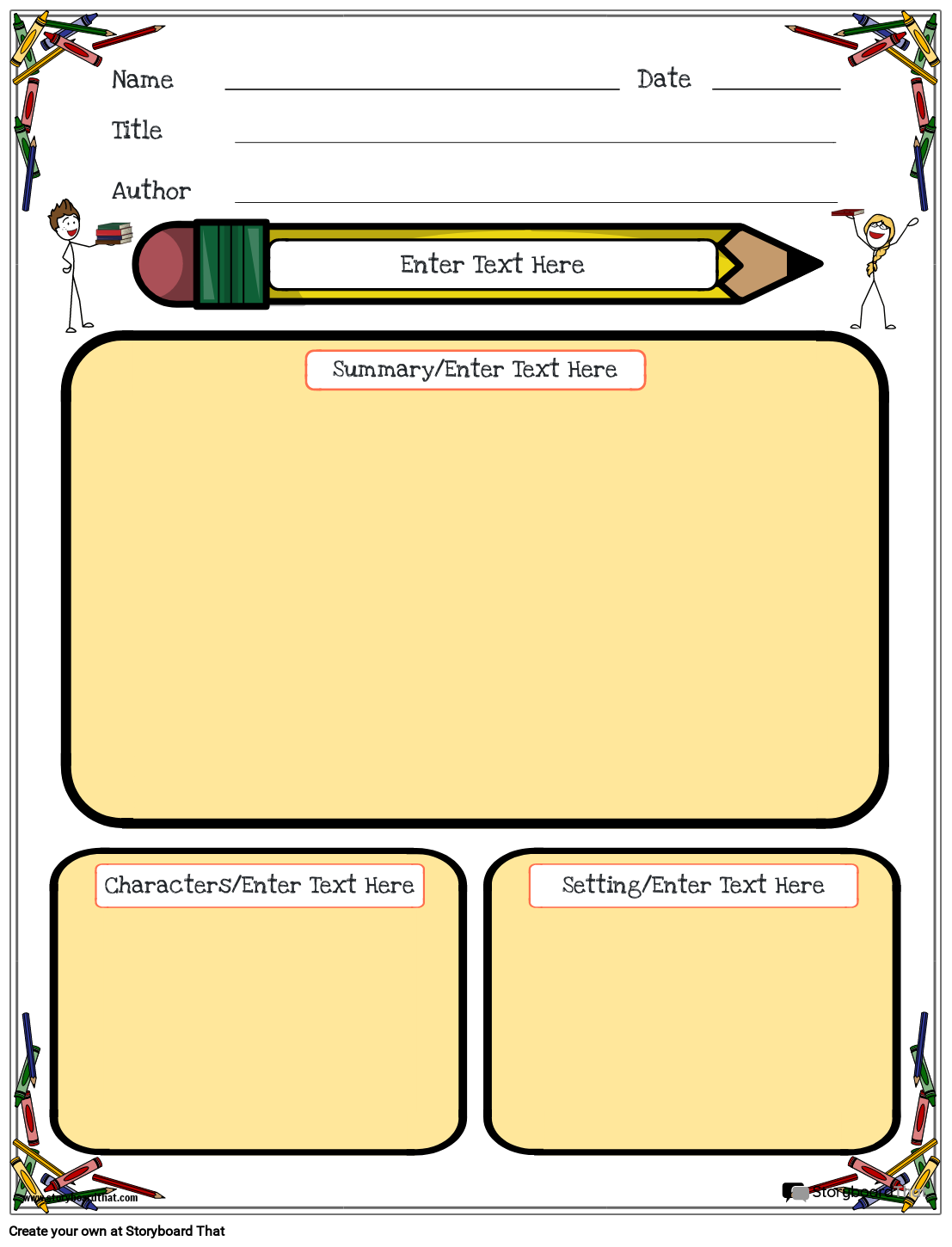
If you're assigning this to your students, copy the worksheet to your account and save. When creating an assignment, just select it as a template!
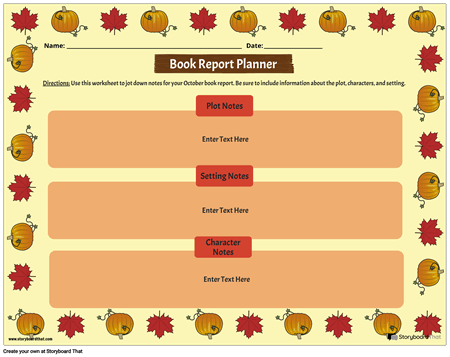
What is a Book Report?
It is a written summary and analysis of a book's content, intended to provide an overview of its key elements, themes, characters, and plot. It is often used as an educational tool to assess a reader's understanding of a book and their ability to critically analyze its various aspects. They can vary in structure and complexity depending on the grade level and educational objectives.
What are Book Report Planning Worksheets?
They are effective tools that teachers assign to students to organize ideas before beginning a larger, more in-depth report. This simple form is meant to highlight the main idea, plot, setting, and main characters of a book, while also showing that students understand what they read, and that they are able to present information about the pages they've read. Planning an outline ahead of time with a Storyboard That template is an essential step towards an incredible and unique project. This planning can be done in class or as homework in note form.
Why are they Important and How are they Best Used?
They are important because they help students create a plan before executing a large project. Students are able to take what they know from the book, and write it all down in one place. They are also able to decide what they want to include, or not include, in their reports by having all of the information laid out in front of them.
In the world of education, fostering reading comprehension and critical thinking skills is a vital mission. These worksheets provide a structured framework that guides the class through a journey of analyzing, understanding, and reflecting on the books they read.
Types of Projects
- The Traditional Report: The traditional approach involves key elements such as the title and author, summarizing the plot, character analysis, setting description, and personal opinions. These worksheets serve as book report forms that students can use to structure a specific idea, as well as their thoughts and insights. Kids are prompted to identify the main ideas, describe the book's aspects, and offer their opinions on their favorite parts.
- Character Analysis: Delving into characters is a fantastic way to enhance reading comprehension. Students can identify character traits, motivations, and changes throughout the story. By using a book report template for kids, teachers guide elementary-age children to critically think about the characters' development and role in the narrative.
- Setting Exploration: Settings often play a significant role in shaping the story's atmosphere and events. Our worksheets offer a structured platform for students to identify and describe the settings, as well as analyze how they impact the plot and characters. This free printable tool engages middle school students and elementary age kids in a deeper understanding of the story's context.
- Comparative Analysis: Comparing and contrasting two books with similar themes or genres is an enriching exercise. Students can analyze characters, plots, themes, and writing styles side by side. This activity encourages critical thinking as students identify similarities and differences between the two works, honing their ability to critically assess literature.
- Book-to-Movie Comparison: In an age where many books find themselves on the silver screen, comparing a book to its movie adaptation can be captivating. With our worksheets, students can highlight the differences and evaluate how successfully the adaptation captures the essence of the novel. This engaging activity invites children to express their opinion on how well the story transitioned from page to screen.
- Critical Book Review: Encouraging critical thinking is a cornerstone of education. Our handouts can be transformed into platforms for students to review what they've read with a discerning eye. By using a book report generator, students can evaluate plot development, character depth, and writing style, strengthening their analytical skills.
- Alternate Conclusion, Ending, or Sequel: Nurturing creativity is equally important. Our templates can serve as springboards for students to imagine alternate endings or sequels to the book. By completing a book report planning form, grade school children create new narrative possibilities, fostering their imaginative thinking.
- Letter to the Author: What better way to engage students than allowing them to interact with the author? Worksheets can include sections for students to write letters to authors, sharing their thoughts, questions, and reactions. This activity bridges the gap between the author's creation and the student's interpretation.
- Book Advertisement: These worksheets can take the form of designing advertisements or promotional posters for the book. By focusing on key aspects, students not only comprehend the book but also learn to present their understanding in a visually appealing manner.
- Timeline of Events: Understanding the chronological sequence of events is crucial in comprehending stories. Templates can be adapted to create timelines of important events from the book. Students fill in the report form with short summaries of events, identifying their significance, and arranging them chronologically.
Tips for Making a Template
- Understand the Purpose: Begin by understanding the purpose. It's a tool designed to guide students through the process of analyzing and summarizing a book's content.
- Identify Your Audience: Determine whether the worksheet is intended for elementary-grade students or middle-school students.
- Choose a Format: Decide on the format of your worksheet. You can use a no prep printable book report template, or create a custom design.
- Incorporate Structured Sections: Include sections for various aspects of the book such as a short summary, character analysis, and personal reflections.
- Utilize Free Resources: Search for free book report templates online to gather ideas and inspiration for your worksheet's layout and content.
- Consider Grade-Level Appropriate Language: Tailor the language used in the worksheet to suit the reading comprehension level of the students for whom it's intended.
- Add Visual Elements: Enhance engagement by incorporating visuals, like images or icons, to make the worksheet visually appealing.
- Provide Prompts for Analysis: Offer prompts and questions that encourage critical thinking. Include questions like "What is a book report?" and "What are some ideas to make your project unique?"
- Offer Space for Personalization: Include sections that allow students to share their personal opinions, a favorite part of the book, and creative insights.
- Include Organizational Tools: Utilize a book report maker or book report generator to create a professional-looking worksheet. A book report graphic organizer can also help students structure their thoughts effectively in their own words.
By incorporating elements like templates, book report planning forms for grade school, and relevant book report examples, you can design a worksheet that guides students through a comprehensive exploration of the book's content while fostering their creativity and critical thinking skills.
More Storyboard That Resources and Free Printables
- Creative Writing Worksheets
- Plot Diagram Template
- Student Planner Template
- Graphic Organizer Templates
How to Make a Book Report Worksheet
Choose one of the premade templates.
We have lots of templates to choose from. Take a look at our example for inspiration!
Click on “Copy Template”
Once you do this, you will be directed to the storyboard creator.
Give Your Worksheet a Name!
Be sure to call it something related to the topic so that you can easily find it in the future.
Edit Your Worksheet
This is where you will include directions, specific images, and make any aesthetic changes that you would like. The options are endless!
Click "Save and Exit"
When you are finished, click this button in the lower right hand corner to exit your storyboard.
From here you can print, download as a PDF, attach it to an assignment and use it digitally, and more!
Happy Creating!
Frequently Asked Questions About Book Reports
Do book report worksheets limit creativity.
No, they don't inherently limit creativity. While they provide structure through elements like book report templates, they can be adapted to encourage creative analysis. By exploring how to write a report that allows creativity, educators can strike a balance between structured analysis and imaginative insights. Ideas can be integrated to spark imaginative thinking. A well-designed book report template for kids allows room for personal expression while maintaining organization.
Do book reports differ based on grade levels?
Yes, they vary by grade level. Elementary reports focus on simple summaries and character descriptions. Middle school reports delve into themes and analysis. High school and college projects demand deeper analysis, including writing style and context. Worksheets and free book report templates can guide each level.
Are book reports limited to novels?
They extend beyond novels to include non-fiction, biographies, and more, and free book report templates adapt to different genres. A versatile book report template for kids accommodates various reading materials, and ideas cater to diverse literary forms.
Try 1 Month For
30 Day Money Back Guarantee New Customers Only Full Price After Introductory Offer
Learn more about our Department, School, and District packages

- Thousands of images
- Custom layouts, scenes, characters
- And so much more!!
Create a Storyboard
- Real Estate
Middle School Outline Template for Book Report
- Paper Templates
- Book Template
- Book Report Template
Download Middle School Outline Template for Book Report
Linked topics.
Related Documents
- Middle School 6th-8th Summer Reading: Book Report Form
- Biography Book Report Outline Template
- Science Fiction Book Report Template
- High School Book Report Template
- Book Jacket Book Report
- Sixth Grade Book Report Form
- Mystery/Suspense Book Report Template
- Cereal Box Book Report Template
- Black History Cereal Box Book Report
- Diorama Book Report Template
- Book Report Outline Template - a Retelling
- Book Report Template - North Carolinians for Home Education
- Book Report Format - Medford Vocational High School Summer Reading
- Book Jacket Book Report Template - Varicolored
- Book Jacket Book Report Template - Black and White
- Cereal Box Book Report Template - With Picture
- Ar Book Report Form Template - Accelerated Reader
- Cereal Box Book Report Template - Without Picture
- Cereal Box Book Report Templates - Table
- Cereal Box Book Report Templates - Black and White
- Convert Word to PDF
- Convert Excel to PDF
- Convert PNG to PDF
- Convert GIF to PDF
- Convert TIFF to PDF
- Convert PowerPoint to PDF
- Convert JPG to PDF
- Convert PDF to JPG
- Convert PDF to PNG
- Convert PDF to GIF
- Convert PDF to TIFF
- Compress PDF
- Rearrange PDF Pages
- Make PDF Searchable
- Privacy Policy
- Terms Of Service
Legal Disclaimer: The information provided on TemplateRoller.com is for general and educational purposes only and is not a substitute for professional advice. All information is provided in good faith, however, we make no representation or warranty of any kind regarding its accuracy, validity, reliability, or completeness. Consult with the appropriate professionals before taking any legal action. TemplateRoller.com will not be liable for loss or damage of any kind incurred as a result of using the information provided on the site.

How to Excel at Junior High Book Reports: Free Book Report Template Inside!
Inside: Thinking of ditching book reports in junior high? Hold that thought! Book reports teach vital skills to teens. Learn how to quickly organize and effectively create comprehensive book reports by using my free book report template, a sample of my comprehensive The Ultimate Book Report Master Guide .
- Share on Facebook
- Email this Page
- Share on WhatsApp
- Share on Pinterest
- Share on LinkedIn
- Share on Telegram
In elementary school, book reports are fun and creative. Just grab a book report template, and you’re ready to go. As students progress to middle and high school, the focus shifts towards deeper writing and analytical skills.
If you homeschool, you might think about skipping book reports. But don’t do that! These assignments are more than just a writing exercise, they are crucial for encouraging critical thinking, comprehension, and organizational skills.
The problem is not every student enjoys them. For kids like mine who dislike writing, or those who are more STEM-oriented and prefer literal thinking, book reports can feel overwhelming.
Recognizing that kids like Marc need a bit more guidance in writing and analyzing literature, I created The Ultimate Book Report Master Guide specifically to support him and other teens with organizing and writing comprehensive book reports.
The guide demystifies the book report process by breaking it down into easy steps. It begins with choosing an appropriate book and extends to writing a well-structured report. Each step is clearly outlined, ensuring kids understand what is expected at every stage.
What about kids who hate reading? They can still do book reports!
I believe that sharing read-alouds with teens is a great way to expose them to good literature even if they dislike reading. Don’t give up on the book reports either. Many times I read the books aloud to Marc so I could follow up with questions, delve deeper into the subject, and get him ready to think about book reports. It’s easier to do so when you know the story firsthand.

Pin this image to read the article later. 📌
Why book reports matter in middle school and beyond
When it comes to book reports in junior high, many of us (including myself) have felt the temptation to skip them altogether.
It’s a natural reaction, especially when we see our kids struggling with or dreading these assignments. But before deciding to leave book reports out, it’s worth considering the skills they bring to the table:
• Critical Thinking : Book reports challenge students to analyze a story’s plot, characters, themes, and messages. This kind of analysis fosters deeper thinking and it’s a skill that translates across subjects.
• Comprehension : Reports require students to not just read but engage with the text. This active involvement boosts their ability to comprehend and remember information, skills that are crucial for academic success in all subjects.
• Expression : By expressing their views on a book, students develop their ability to communicate effectively. This develops their communication skills both in written and oral form.
• Organization : Reports teach students how to structure their ideas logically. Organizing ideas in a book and getting out the essentials is extremely difficult and it takes time and patience to master. Book reports offer this opportunity.
• Resilience : By doing something that might appear difficult, teens are only building their resilience. Writing a book report is not something they can do in a couple of hours. It takes days of hard work from actively reading and taking notes, to organizing, planning, and editing their work to make it the best they can make it.

While the initial knee-jerk reaction for us this year was to quickly skim and skip over book reports, particularly since writing isn’t Marc’s favorite, I thought about these benefits and decided to model them as best as I could for him. That’s how my The Ultimate Book Report Master Guide was born.
The Ultimate Book Report Template for junior high
Ever felt stuck finding the right book report template for junior high? So did I! That’s why I rolled up my sleeves and created the Ultimate Book Report Master Guide .
Writing a book report in upper middle school or high school is challenging. It’s not just about summarizing a story. Students need to learn how to analyze books in depth, but often they don’t get enough guidance on how to do this and we expect them to magically formulate the perfect book report.
When I created this guide, I thought about all the questions and challenges students like my son might face. I wanted to address everything from the basics of writing to the more complex aspects of literary analysis. This guide helps students not only write and summarize but also critically analyze literature. It teaches them how to organize their ideas and express their understanding clearly in writing.
This template is more than just a basic structure for a book report, it is a master guide that teaches students how to analyze literature critically, organize their thoughts, and articulate their understanding in writing. It emphasizes critical thinking, comprehension of literary elements, and structured writing skills, making it a valuable resource for teens.
You can get my full guide on Amazon: Monkey and Mom Homeschool Ultimate Book Report Master Guide .

You can also get a 30+ pages free sample of this guide, including a full book report template, checklists, instructions, and examples by subscribing to my newsletter. Remember, this is just a small piece of the full book.
What are the 5 secret ingredients of comprehensive book reports?
What I like telling Marc is that there are almost always recipes for writing a certain assignment. You only need to analyze examples or the rubrics provided to get a sense of direction.
Writing a book report for junior high is not that difficult when kids know what’s expected. So what’s the secret recipe for writing a great book report?
1. Use advanced vocabulary
The main aspect of well-developed book reports and even essays is using advanced vocabulary. Encourage kids to start with simple words in the draft, then spice it up with stronger vocabulary during revisions.
Remind them that it’s not about using big words for the sake of it, but about choosing words that add clarity and depth to the writing
We all know how overused words can affect the level of a written paper. The writing program we use, Structure and Style for Students has special sections of “banned words” prompting kids to select other words instead. This has helped Marc be more creative in his writing and actually open up the thesaurus.
The trick here is not to overdo it, and never encourage them to use words they don’t understand.
2. Master literary analysis
A junior high level book report goes beyond mentioning the author and summary of the book. As the requirements keep increasing, it’s essential to start explaining literary terms to kids and encourage them to start using these terms.
While this is a part of literature, book reports present the perfect opportunity to start using these terms. If your kids only know a few of these, or they are just learning literary analysis, encourage them to only use the terms they know. This not only makes the report sound better, but it also cements the information they have about literary terms.
Literary analysis isn’t easy, but you can help kids to start using terms like ‘narrative’ instead of story, ‘character development/evolution’, or ‘plot’. Their sentences will automatically sound better with a few tweaks.
As always, it’s important kids understand what these all mean and how to integrate them seamlessly into their reports, that’s why I included the most important terms for literary analysis in my Ultimate Book Report Master Guide .
A great way to learn how to use these in context is by exposing kids to literary critiques or advanced book reports. Modeling is still very important even in junior high years when kids are transitioning to more advanced requirements. To help, I included both beginner and advanced examples for book reports in my book.
Encourage kids to create a list of expressions and words they like when they see these used in the examples provided. They can refer back to the list when they are writing their own reports to see if they can incorporate them.

3. Start with the rubrics
If you have rubrics or guidelines, start there before planning the book report or using any book report template. There are various requirements for structure and what needs to be included, depending on the school or curriculum you use. Make sure kids know exactly what the requirements are before starting to plan their report.
I included teacher and student rubrics in my book, but use these only if your curriculum or school didn’t provide any.
If the requirements are different, make sure to adapt the book report template I included and change the sections that need to have different information.
4. Critical thinking
Great book reports include personal points of view, connections with other works, and recommendations that are backed up with evidence.
One critical step to make sure your kids have all that included is to ask them to take notes of the way they feel while reading certain sections of the book. This doesn’t have to be extensive.
Also, especially when reading nonfiction, ask kids to dig a little information about the author and the context in which the book was written. They can later use this while reading the book to see if the context influenced the views presented in the book in any way.
Encourage them to think of other similar works, or books written by the same author, or even connect the book with the movie if they’ve seen it and include brief comparisons and parallels between these.
5. Active reading
Maybe the most important prerequisite of a great book report is the act of active reading.
Encourage kids to keep a notebook close while they read and use sticky notes and sticky highlighters to mark pages that impressed them or seemed important to them.
Also, encourage them to take out any quotes that they found memorable. They can use these as evidence when writing their report to back up any claims they make. That’s what makes a great critique.
Active reading is a great way to stay focused and pay attention to what happens in the narrative.

Planning the perfect book report
Creating a standout book report involves a few key stages – before, during, and after reading the book. Let’s walk through each phase to ensure kids are fully prepared to tackle their book report assignments:
Pre-reading
Encourage kids to pick a book that really interests them, not just because it’s short or easy. It’s important they feel connected to the book to stay engaged in the project. For inspiration, we often turn to BookShark ‘s historical fiction reading lists – they’re full of engaging and adventurous choices.
While reading
Ask kids to think about the setting, characters, plot, and themes of the book while they are reading. They should write down any ideas they have on these while they read.
If they have any questions or parts they don’t understand they should note those questions down as well.
Encourage even younger readers to take a moment to think about the kind of language the author uses. Do they notice anything special about it? Can they use this in their report?

Post-reading
Once they finished reading, encourage them to think about the book as a whole. How do they feel about it? What are the highlights of the book and what do they remember most vividly? Did the book change their perspective on anything? Did they learn something new?
After this thinking exercise, it’s time to plan the actual book report, making use of any rubrics, book report templates, and requirements.
In my Ultimate Book Report Master Guide , I broke down every paragraph in a book report to show kids what needs to be included in each. I also added examples of well-structured paragraphs for each part. Depending on the assignment, you might only choose to do part of these.
Here are the main paragraphs:

1. Strong introduction
A good book report has a strong introduction that grabs the reader’s attention. If kids don’t know how to write strong hooks, make sure you cover this with them before asking them to write it.
The introduction should also cover the basics of the book, like title, author, and genre as well as a very condensed summary in 1-2 sentences that outlines the main theme or content of the book.
The introduction should then end with a thesis statement that clearly outlines all the topics that the book report will cover.

2. Body paragraphs
Each body paragraph should focus on a single topic that was included in the thesis statement. These usually include (but aren’t limited to) the summary, setting, characters, and theme. Kids can also be asked to analyze an author’s intent, analyze the mood or tone of a story, and more.
Whenever they craft a paragraph kids should remember to use a topic sentence and then supportive examples. Ask them to think if they can go further by using concrete examples or important quotes to help underline their points.
One trap some kids fall into is they go into too much detail. Remind them they have to choose only the most important and relevant aspects of the story to mention in the book report.
Another trap is simply summarizing what happened in the story. Remind kids to stop and offer their insight into every paragraph they write. Is there anything they noticed that pertains to literary analysis and they can add to cement their topic sentence?

4. Evaluative paragraphs
These are still part of the body paragraphs, but since they are so important and relevant to book reports, I chose to highlight them separately.
Kids should write one or two paragraphs around their opinion about the book (whether they liked it or not) and recommendation (whom would they recommend the book to). This doesn’t always need to be positive but remind them it always needs to be supported by details and examples.


5. Reflective conclusion
A great conclusion will summarize everything covered in the book report. Kids should restate the thesis (preferably in different terms than in the introduction), and reflect the introduction.
Remind kids to also include a last sentence containing the essence of the report and book they read. They will use this at the end to craft a compelling title for their report.
6. Presentation (optional)
If they are required or want to, kids can illustrate the book report or choose to make a presentation, write a theme song, create a video, or include another creative outlet to accompany their report.
Our 7th grade book report choices
For 7th grade this year we are doing BookShark’s history curriculum , so we decided to choose some of the books we will read for history to do our book reports.
Our school, Bridgeway Academy asks 4 book reports per year, so we chose the following (click on the image to see the book on Amazon- affiliate links)
The Golden Goblet by Eloise Jarvis McGraw:

- Recommended for: Students interested in historical fiction, ancient Egypt, and coming-of-age stories.
- Educational value: Offers insights into ancient Egyptian culture, history, and the life of a young protagonist.
- Reading level: Generally accessible to 7th graders with average reading skills.
Adam of the Road by Elizabeth Janet Gray:

- Recommended for: Students interested in historical fiction set in medieval England and adventure stories.
- Educational value: Provides a glimpse into medieval life and the challenges faced by a young minstrel.
- Reading level: Accessible to 7th graders, though it may require slightly advanced reading skills.
The Shakespeare Stealer by Gary Blackwood:

- Recommended for: Students interested in historical fiction, theater, and mysteries.
- Educational value: Offers insights into Elizabethan England, the world of Shakespearean theater, and moral dilemmas.
- Reading level: Generally accessible to 7th graders, although some of the language may be challenging.
The Samurai’s Tale by Erik Christian Haugaard:

- Recommended for: Students interested in historical fiction set in feudal Japan, samurai culture, and coming-of-age stories.
- Educational value: Provides a rich portrayal of feudal Japan and explores themes of honor and loyalty.
- Reading level: Accessible to 7th graders, though some passages may require additional explanation due to cultural differences.
How we approach book reports in 7th grade
Since this year is the first year I introduced Marc to literary analysis, I will guide him every step of the way.
We are reading the four books together and I am using the Ultimate Book Report Master Guide to explain every section of a book report to him. He has done book reports in 4th grade , but this time I want him to go beyond merely using a book report template, and into actually writing it as an essay.
So far, we’ve covered The Golden Goblet . You can get the typed version of our book report with the freebie I am offering.
We used the included book report template from my book as an outline which Marc filled in himself. The questions helped guide him. Then I helped him craft a rough draft guiding him with questions and using the Ultimate Book Report Master Guide as a guide.
Once he was done with the rough draft, I encouraged him to change some expressions and words to more advanced ones from our list and I made him read it aloud to me. When we’re both happy, I dictated it to him to write by hand. The Egypt-inspired paper he wrote them on was from my Egypt Printable Writing Pack .

I don’t let him type these, because I intervene quite a bit while he is writing them.
He is capable of creating decent ones on his own, but I see these last two years until high school as perfect opportunities for more modeling. And great writing only happens through constant exposure and modeling.
There’s very slow growth if we allow kids to make the same mistakes over and over again because we fear interfering.
By showing him how a sentence can sound better, how he can replace some of his overused words with stronger ones, I model to him not only advanced writing, but also my whole thinking process.
And he is learning. He tells me a lot of times he wouldn’t have thought of that particular way of putting it and is impressed on how good it sounds. I’ve been doing this with him for years now and I noticed him picking on my habit of wanting to improve his writing with better words.
Wrapping up
It’s no secret that writing book reports can feel overwhelming, especially if your kids are more inclined towards non-humanities subjects. It might even be tempting to skip them altogether. But let’s pause and reconsider.
Book reports are more than just assignments. They’re valuable tools in teaching our teens a range of skills. From building resilience to enhancing critical thinking, and from improving communication to honing organizational and writing abilities, book reports play a crucial role in a teen’s development.
I created the Ultimate Book Report Master Guide with the hope that it makes the journey less daunting for both you and your kids. My goal is to help you guide your children in crafting book reports they can be proud of, contributing to their growth as resilient, lifelong learners. Remember, these skills are built gradually, one step at a time.
So, before you decide to bypass book reports, think about their long-term benefits.
I’m curious to know your thoughts. Do you feel book reports in junior high are unnecessary? Are you relying solely on templates for book reports? Share your strategies and experiences in the comments below. Leave a comment below and let’s talk more.

This post may contain affiliate links. By making a purchase through these links, I get a small percentage for the item you bought while the price stays the same for you. Thank you for supporting me . As an Amazon Associate I earn from qualifying purchases.
Read my Disclosure to find out more about how I support my website and how you can help.
I'm a homeschool mom and photographer that loves reading, traveling and writing about our homeschool adventures.
I live in Europe with my 13-year-old son who is a handful to raise and educate. He is gifted in STEM and my opposite in every way. So life is never boring for us.
I've been homeschooling for 7 years ⭐️ now and I feel I still have so much to explore and learn but at the same time, I've gathered a lot of information during these years.
I want to share my ideas and discoveries with you and I love talking to other homeschool parents and learning from them.
"We rise by lifting others" is my favorite motto. That's why I love sharing and helping whenever I can. So don't shy away from dropping me a line. I always love hearing from you 🤗
Similar Posts

The Truth About IEW Writing Programs : SSS, TWSS, TBW (II)
Are you feeling confused or overwhelmed about all the options you have with IEW writing? Then you’re in the right place! We’ve talked about IEW’s holistic approach to writing and why that’s important when teaching writing, now let’s dive into the way IEW teaches writing, and the 3 different options…

Homeschool Science Labs – Online or Offline
Science isn’t everyone’s cup of tea. But as many homeschool parents realize, it’s an important part of homeschooling. We might wing it during elementary, but what about those homeschool science labs for middle and high school? Fear not, for there are several solutions to these labs, including making your own…

Classical Literature in the Digital Age| Heritage Humanities for Homeschoolers
Inside: Heritage Humanities transforms the rich, complex world of classical literature into something accessible and engaging for today’s digital natives. Diving into classical texts of English literature can often feel like navigating a labyrinth, especially for young learners. Marc’s recent experience with the CLT8 exam highlighted a significant gap in…

Picking the right microscope for your homeschooling
Picking the right microscope for your homeschooling depends on what you need. Here’s how we picked ours and what to look for when picking your own microscope.

Academic Vocabulary-Take Your Homeschool Vocabulary Further with Evan Moor
While we can learn new vocabulary by reading, and M is a voracious reader, I still feel that we need to work on it diligently, year after year. But an aspect that I feel isn’t covered enough by just reading literary works is academic vocabulary. If you’re like me, you’re…

The Art of Child-Led Learning: A Homeschooling Trend Worth Following?
Inside: Ever wondered about the magic formula for instilling a lifelong love of learning in kids? The answer lies in balancing child-led learning with structured guidance. This approach creates a flexible yet focused educational experience that sparks curiosity and allows skills to develop at each child’s unique pace. When I…
Leave a Reply Cancel reply
Your email address will not be published. Required fields are marked *
Save my name, email, and website in this browser for the next time I comment.
All Formats
Report Templates
7+ middle school book report templates & samples – doc, pdf.
Book reports are an essential curriculum for middle school students. The book report activity is meant to polish up the analyzing and creative senses in students and hence a must done. Does your child too need to submit a middle school book report templates in his class soon? Well, in case he does not know how to compile an effective middle school book report, you can advise him to look for a middle school book report templates . These templates are offered by a lot of sites over the internet.
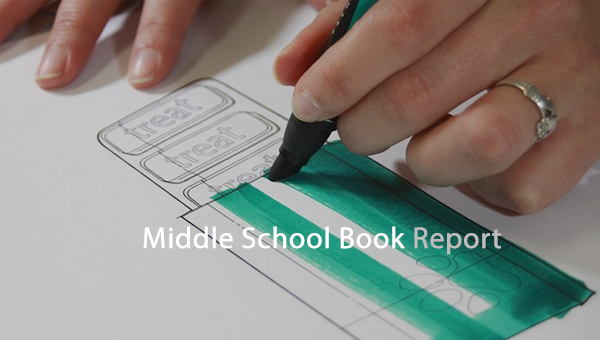
- 327+ Report Templates in Word
- 327+ Sample Report Templates
Report Template Bundle
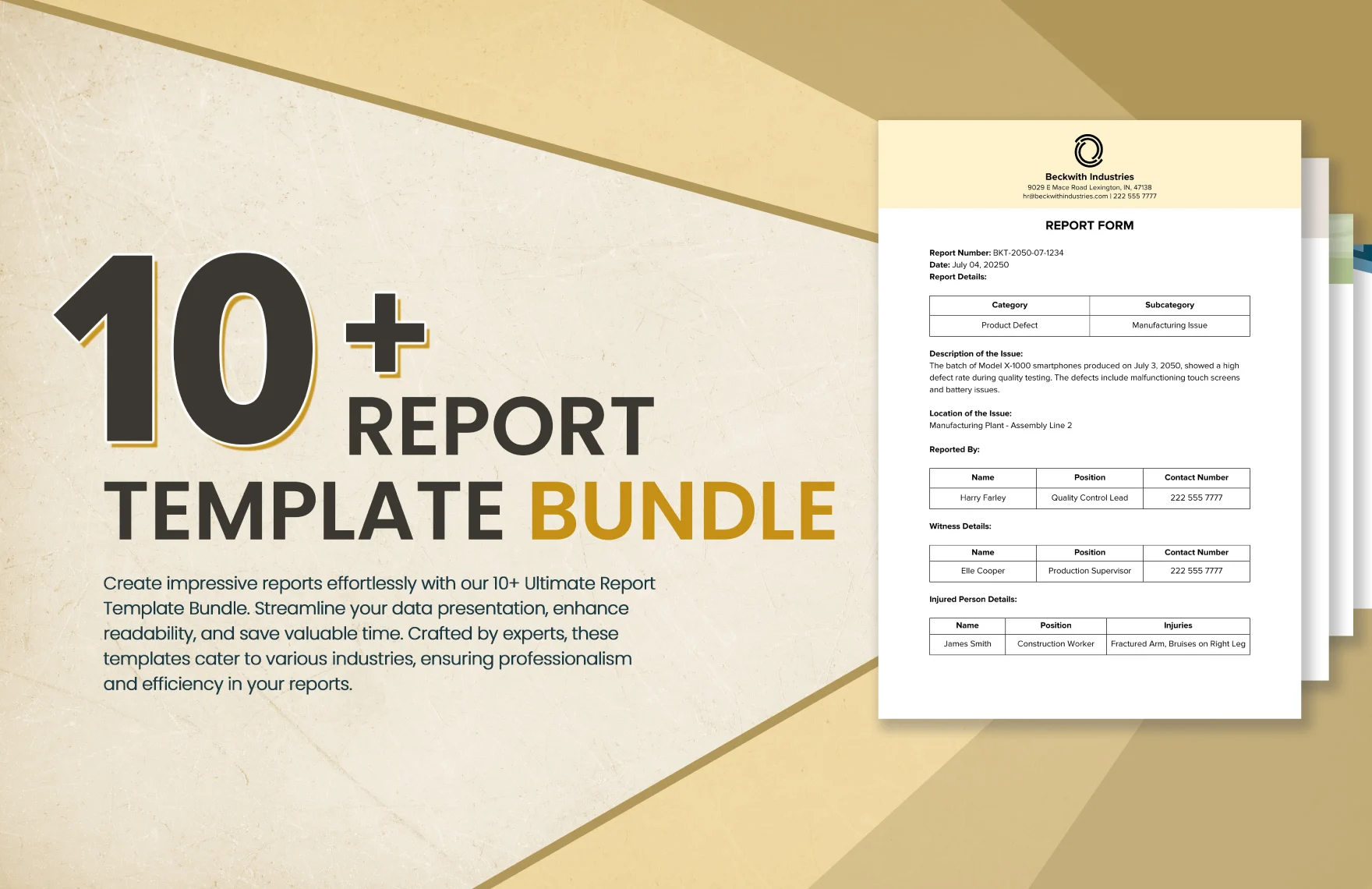
- Google Docs
Book Report Template
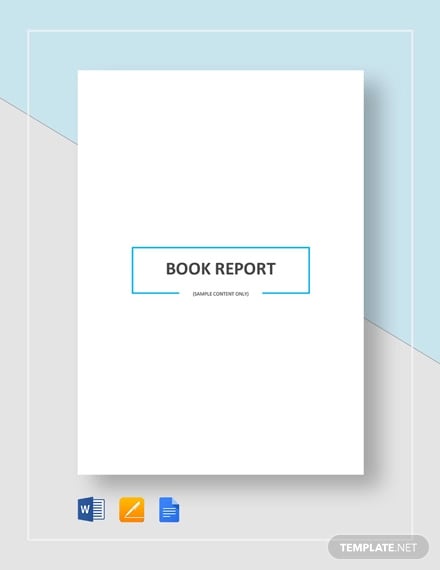
Free Book Report Template
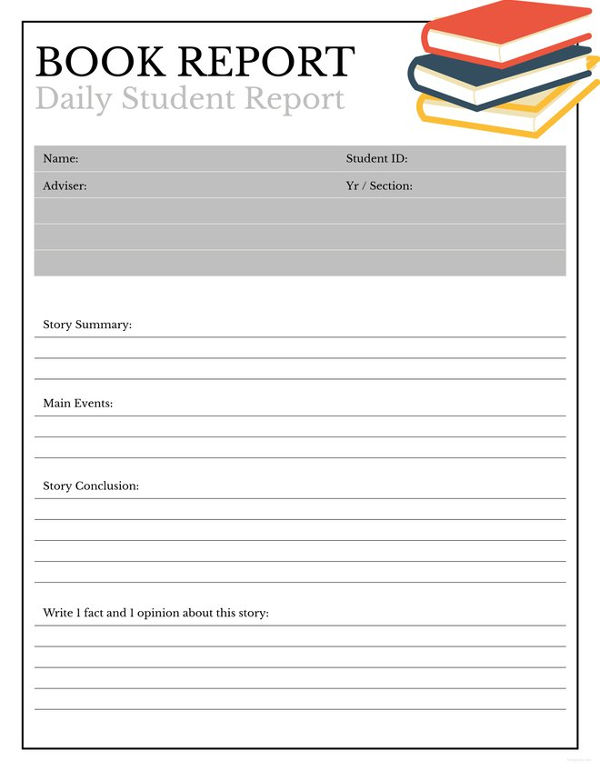
- Illustrator
- Editable PDF
Free Middle School Book Report Format
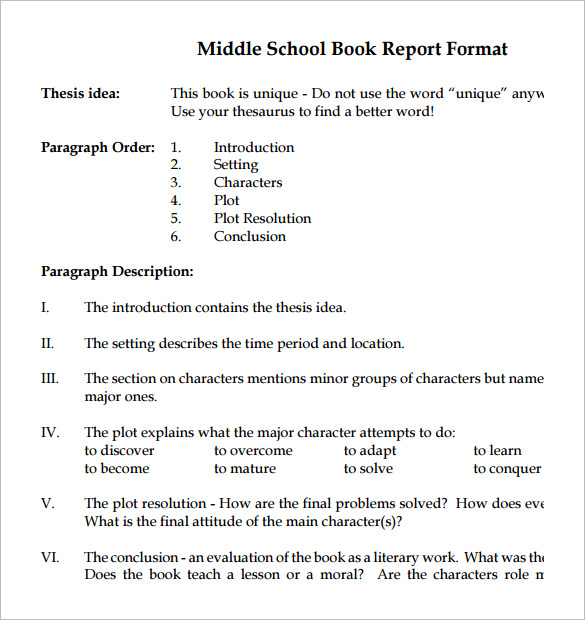
Download Middle School Book Report in PDF
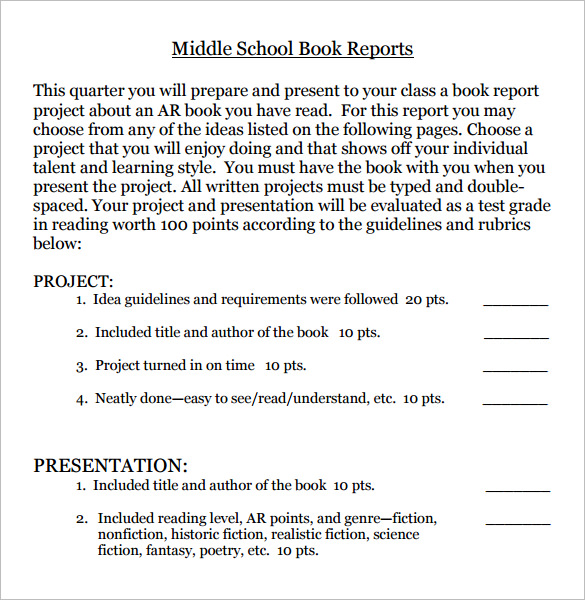
Sample Middle School Book Report Template
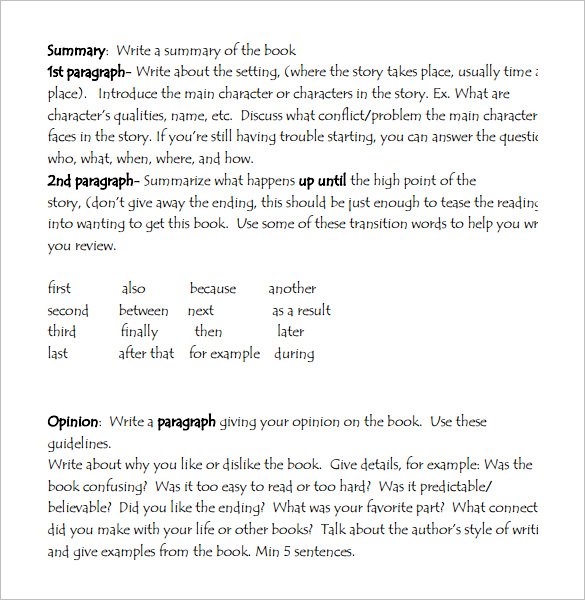
Free Download Middle School Book Report Template
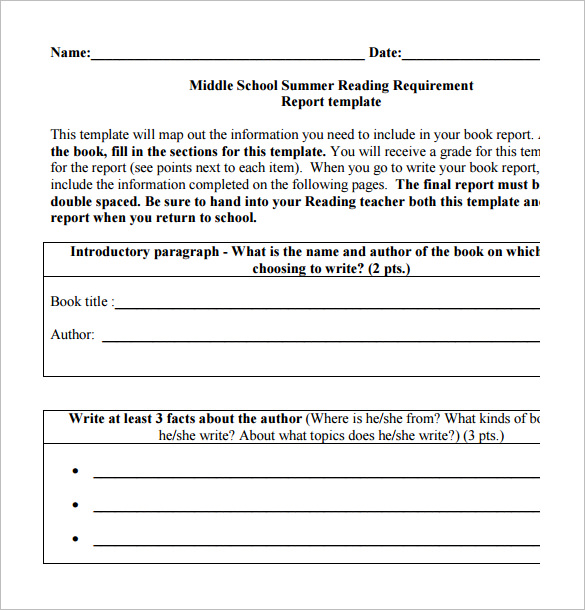
Middle School Book Report Fiction
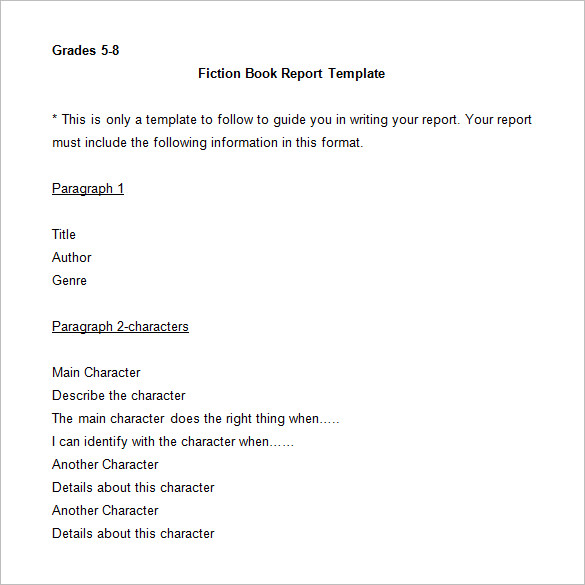
Middle School Biography Book Report Template
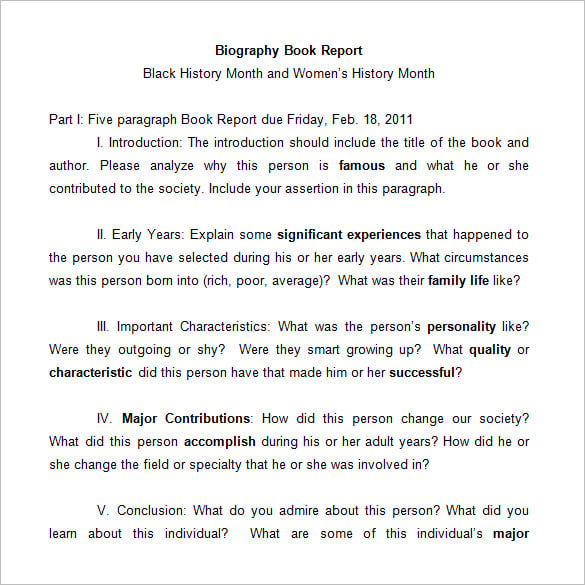
More in Report Templates
School sports program brochure template, science subject for middle school presentation template, middle school counselor cover letter, school cash management policy template, school lesson plan analysis template, science subject for middle school presentation, science study guide template, fluids and electrolytes study guide template, middle school lesson plan template, school financial reporting policy template.
- How to Create a Financial Audit Report [10+ Templates to Download]
- 40+ Monthly Management Report Templates in PDF | Google Docs | Excel | Apple Pages
- 25+ Non Conformance Report Templates – PDF, Docs, Word, Pages
- 19+ Event Report Templates – Word, PDF, Docs, Pages
- 34+ Report Card Templates- Word, Docs, PDF, Pages
- 23+ Sample Inspection Report Templates- Docs, Word, Pages
- 36+ Weekly Activity Report Templates – PDF, Docs
- 10+ Free Audit Findings Report Templates in PDF | MS Word
- 10+ Audit Exception Report Templates in PDF | MS Word
- 11+ Audit Committee Report Templates in PDF | MS Word
- 6+ Logistics Audit Report Templates in PDF | MS Word
- 11+ Logistic Report Templates in PDF
- 8+ Logistics Monthly Report Templates in PDF | MS Word
- 17+ Internship Student Report Templates
- 64+ Monthly Report Samples
File Formats
Word templates, google docs templates, excel templates, powerpoint templates, google sheets templates, google slides templates, pdf templates, publisher templates, psd templates, indesign templates, illustrator templates, pages templates, keynote templates, numbers templates, outlook templates.
- Grades 6-12
- School Leaders
Free end-of-year letter templates to your students 📝!
Free Book Report Templates: Printables for Grades 3-5 for Fiction or Nonfiction Books
Take a new spin on your book report assignment. 📚😍
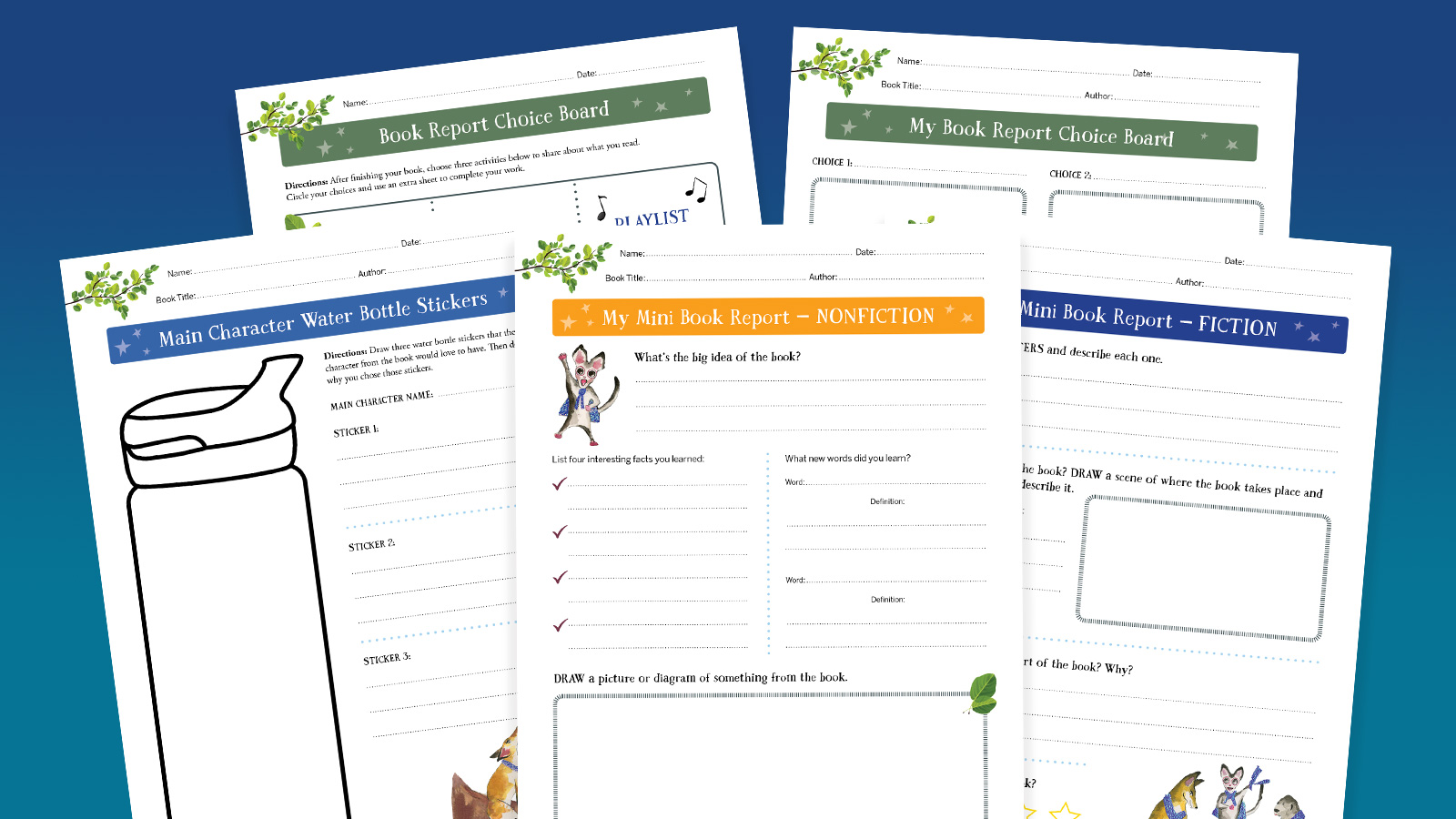
The Nocturnals are fun-filled animal adventure books with companion nonfiction for elementary school classrooms. Check out The Nocturnals World , a resource hub with free turnkey printable activities and educator guides, and browse The Nocturnals bookstore!
Building lifelong readers is one of the most important things we can do in our classrooms. The benefits of reading are wide-ranging, from improving vocabulary skills to boosting cognitive development, concentration skills, and curiosity for learning. So, how do we get young learners excited about reading and sharing what they’ve learned? Check out our free book report template printables .
Four different activities are ready to print to help you take a new spin on your next book report assignment for fiction or nonfiction books. Students will love filling in their mini book report one-pagers or making their selections from the choice board to share details about what they read.
Worksheets Included:
My mini book report—fiction and nonfiction.
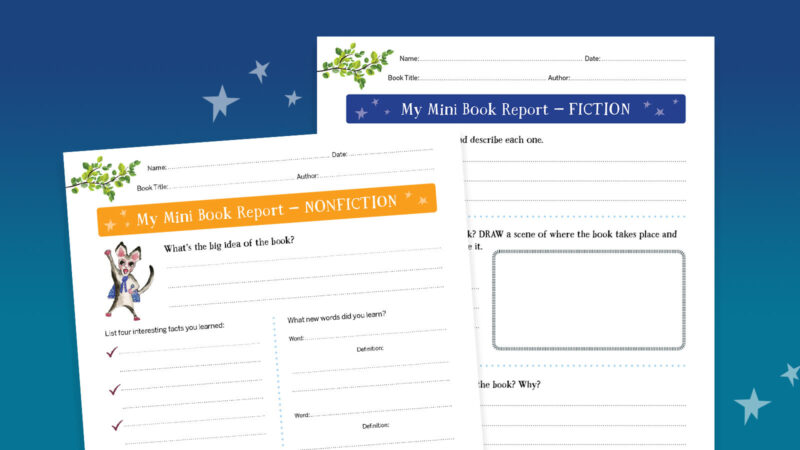
These book report one-pagers are a great way for students to reflect on their readings as they complete different sections of the worksheet. There’s a version for both fiction and nonfiction.
Book Report Choice Board
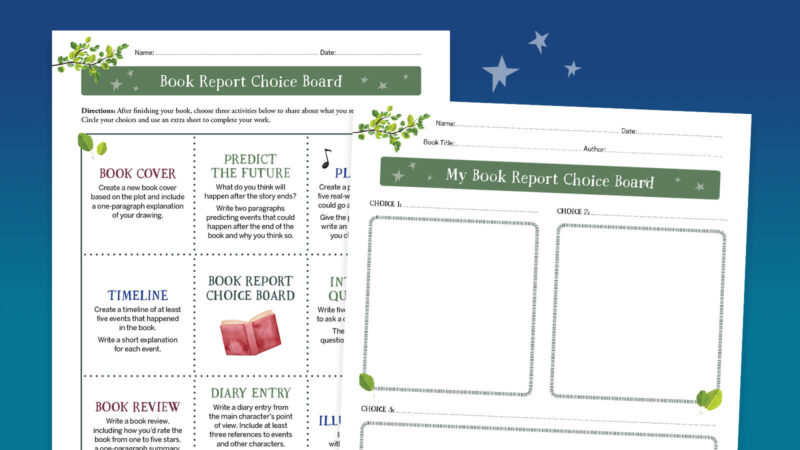
Give students choices on how they want to complete their book report assignment. This choice board offers eight fun options, from designing a comic to creating a playlist or writing interview questions, so students can let their creativity guide them.
Designing Water Bottle Stickers
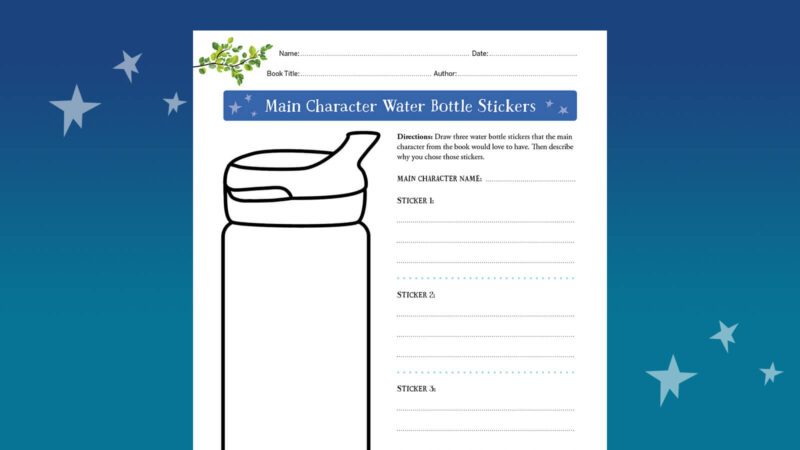
Students are obsessed with stickers. In this unique activity, students will design water bottle stickers that the main character of the book would love to have, along with a short description of their choices.
Give students fun-filled books to choose from
Animal adventure books from The Nocturnals are the perfect way to get your upper elementary students excited about reading. Paired with nonfiction companion texts that explore nocturnal animal facts, this series is great for hi-lo readers. Visit The Nocturnals World for more free printable activities and educator guides.
You Might Also Like

We Know Time Outdoors Is Good for Kids, So Why Is It So Hard To Make Outdoor Learning Happen?
We hear you and have ideas to help. Continue Reading
Copyright © 2024. All rights reserved. 5335 Gate Parkway, Jacksonville, FL 32256
Make Professional Life Easier!
25+ Free Printable Book Report Templates [Word | PDF]
Home / Education Templates / 25+ Free Printable Book Report Templates [Word | PDF]
Teachers and students use book report template to cut down some of the workloads. Teachers assign a lot of book reports to the students to make sure that students read a lot of books. These well-designed book report templates help the students to enjoy the act of reading and can become lifelong learners.
Table of Contents
- 1 What is a book report?
- 2.1 Simple or short book report:
- 2.2 Multi-page book report:
- 3 Parts of a simple and multi-page book report:
- 4 Tips for the teacher to assign the book reports to the students:
- 5 Tips for students to fill out book reports:
- 6 How to write book reports in different ways?
- 7.1 Read and mark the report
- 7.2 Make changes to the report
- 7.3 Review the report
- 8 Why should provide a book report form?
- 9 Conclusion:
- 10 Faqs (Frequently Asked Questions)
What is a book report?
In elementary and middle school, book reports are given to the students as an assignment. It contains basic questions about the book that is assigned to the students to read. When students answer these questions, it acts as evidence to the teacher that they read the book. Moreover, a comprehensive book report contains the following elements;
- The detail what the book was about
- The names of the main characters
- What the theme of the book is
- Where the events are set
Some book reports also ask critical viewpoints about events and characters to make sure that the students read the book completely. Also, by asking such questions students can understand the book better.
Types of book reports:
Generally, there are two types of book reports;
Simple or short book report:
A simple or short book report is given by the teachers to the students and can be completed in one night like a homework assignment. They just have a few questions that students answer in a few short sentences.
Multi-page book report:
This type of book report takes more than one night to complete. For middle school students, this report consists of two pages . While for high school students, students have to submit five-page reports.
Parts of a simple and multi-page book report:
A simple book report contains a few sections. This report asks students to answer questions in paragraph format. However, all types of book reports ask for the title, author name, and the illustrator’s name (if it is a picture book). The other components are;
- Setting: the place where book events happen.
- Characters: names of the main characters
- Plot: an overview of the main events of the book.
- Comment section: whether the reader likes the book or not.
A simple report book also just asks three questions from the students the beginning, the middle, and end events. Sometimes the climax of the book where the main character’s problems are solved or made complicated also expected to determine by the students.
Teachers also demand from the students to write a multi-page book report. This report can be written by using software like MS Word. Additionally, this report is written out in paragraph form. The best way to write this multi-page report is to divide it into three basic sections;
- Introduction: it contains the title, author, genre, and the reason why you choose the book.
- Main Body: The main body or middle part of the report contains the summary, theme, setting, and characters.
- Conclusion: in the end, provide a short summary of the book and your opinion about the book.
Tips for the teacher to assign the book reports to the students:
During assigning the book reports to the students, teachers have to keep the following tips in mind;
- At first, the teacher should assign one book to read to the whole class. It can cut down the efforts of teachers to understand the submitted reports of the whole class.
- Always use a short book report template and there is no need to create one from scratch.
- You must print out more copies of the book report template than needed because sometimes students lose theirs.
- Before a book report due date, reminds the students at least twice.
- When reading activity includes a lot of book reports then it should be turned in a drawing, diorama, or another project.
Tips for students to fill out book reports:
- Before a book report due date, make up a reading schedule to complete the book. You can also use a calendar to remind yourself.
- Next, make a schedule and assign yourself to complete different steps every day .
- You can also ask for some help from your teacher to get started. Moreover, you can also use completed reports as a reference.
How to write book reports in different ways?
Both students and teachers can use creative ideas to write book reports instead of straightforward reports.
- You can write a book report in the form of a newspaper or blog review. Write the summary of the book without using the plot or the ending headings. State the reasons why you like it or not. Also, provide an up or down rating at the end.
- A book report can be written in the form of a diary. Use journal templates to create a diary. It should be written by one of the main characters. According to the character’s point of view, discuss the different events of the book.
- Choose one of the characters in the book and create an imaginary interview. Then, ask questions; Where they come from Why the character did something important to the plot What the character thinks about the consequences of the events in the book.
- The book report can also be written in the form of a newspaper article detailing one of the major events in the book. Answer 5Ws such as who, what, where, when, and why of these events in the article.
What to do after writing the report?
Consider the following steps to finish up the reports;
Read and mark the report
Read the report from start to end to make sure it contains all details. If you find any spelling or punctuation errors then mark them with a brightly colored pen. Young students may ask their parents or students to read through their reports. The teacher should ask their students to submit rough drafts of their reports before the final report is due. This way, they can review their drafts and give them suggestions to change the report before final submission.
Make changes to the report
Any grammatical or spelling that you highlight, fix them. Consider your teacher’s suggestions or the ideas that you wrote down to edit in the report. After making changes to the report, save your file as a separate document.
Review the report
When you are done making changes to the report, it’s time to print out a fresh copy of the report. Once again go through it for spelling errors and grammar mistakes. If you find any sentence that doesn’t make sense fix them in the document file and review them one more time. When you assure that there are no mistakes left, print out it.
Why should provide a book report form?
For elementary school classes, a book report is a popular choice of assignment. With the help of this form, students simply complete the report by filling out the worksheet. It depends on the teachers whether they include standard questions in the sheet or they make a unique sheet containing questions specific to each different book that is assigned.
Furthermore, you can introduce students to an idea of a book report format by using these forms. You also show them what kind of information they have to include in the multi-page reports in higher grades. For teachers who have a large classroom and more assignments to check, a form is also easier to grade.
Conclusion:
In conclusion, a book report template is helpful for the teachers and students because it cuts down some of the workloads. These templates are formatted academically. Moreover, the book report should be comprehensive and includes the author’s background, a summary of the book, and well-reasoned arguments made by the writer of the report.
Faqs (Frequently Asked Questions)
A book report consists of a page count of 3-4 pages if it falls between 800-1,000 words and has Times New Roman font.
There are 5 parts of a book report; 1- Book’s author 2- Title 3- Characters 4- Setting 5- Plot
How useful was this post?
Click on a star to rate it!
Average rating / 5. Vote count:
No votes so far! Be the first to rate this post.
As you found this post useful...
Follow us on social media!
You Might Also Like
25 printable unit circle charts & diagrams [word, pdf], best essay outline templates (argumentative, persuasive, narrative), 26 best cornell notes templates word (samples & examples), 25+ free concept map templates (word, powerpoint), 25+ free course syllabus templates [word], 25+ free thesis statement templates & examples (word, pdf), blank graph paper template free (word, pdf), free diploma templates (high school, college, homeschool), free genogram templates & symbols [ms word], 20+ printable ten frame templates (ms word).
Got any suggestions?
We want to hear from you! Send us a message and help improve Slidesgo
Top searches
Trending searches
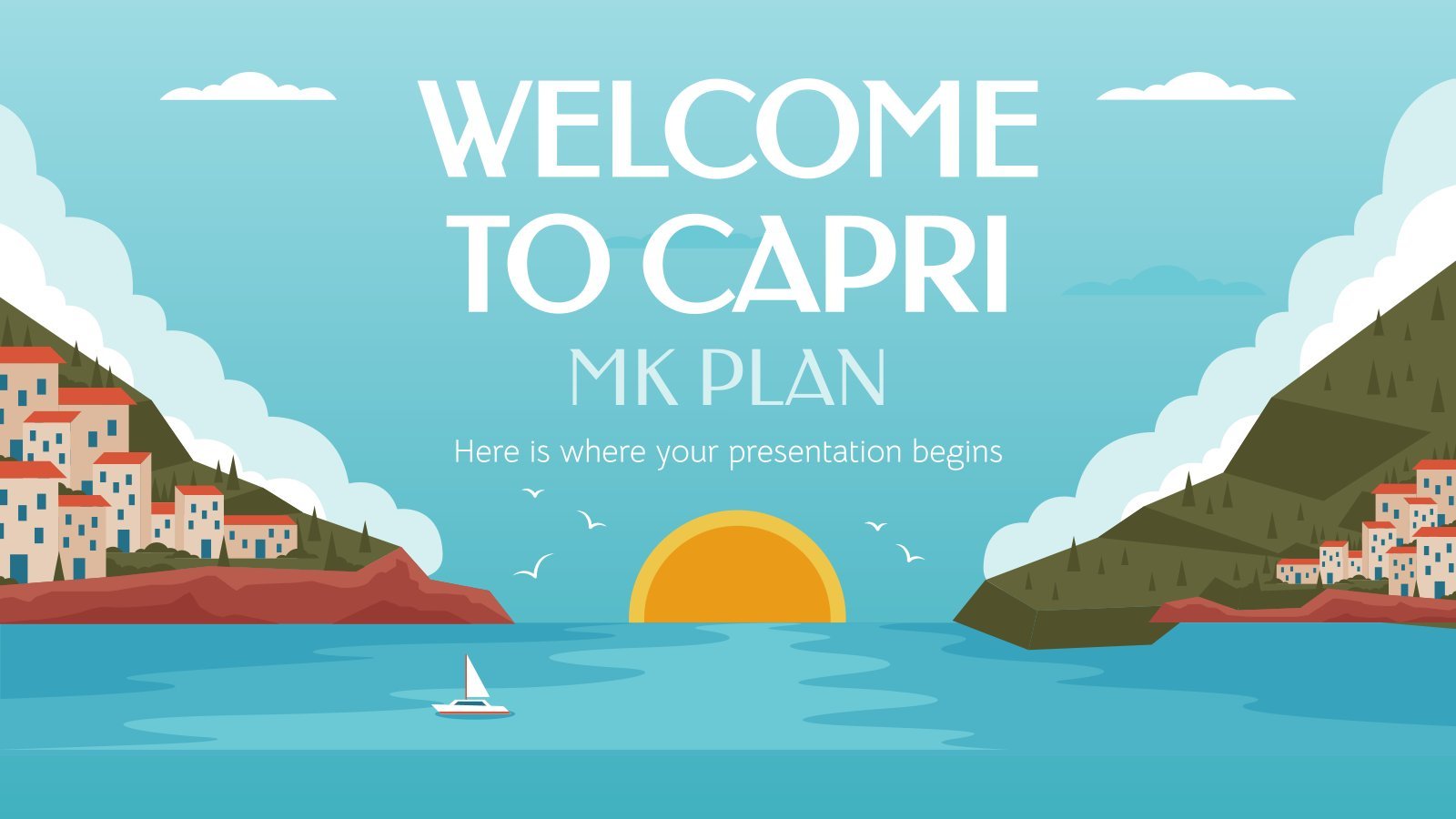
11 templates
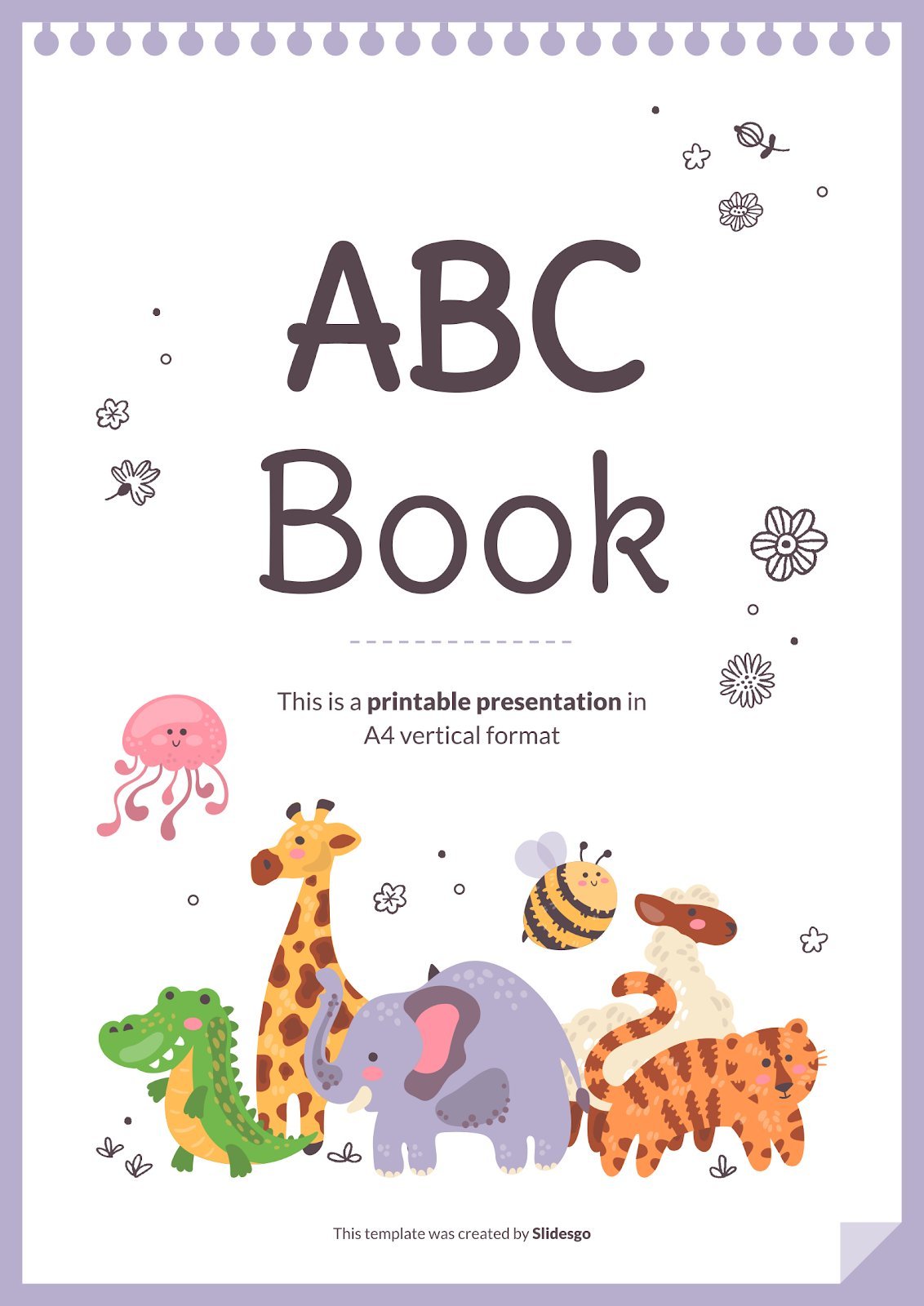
9 templates
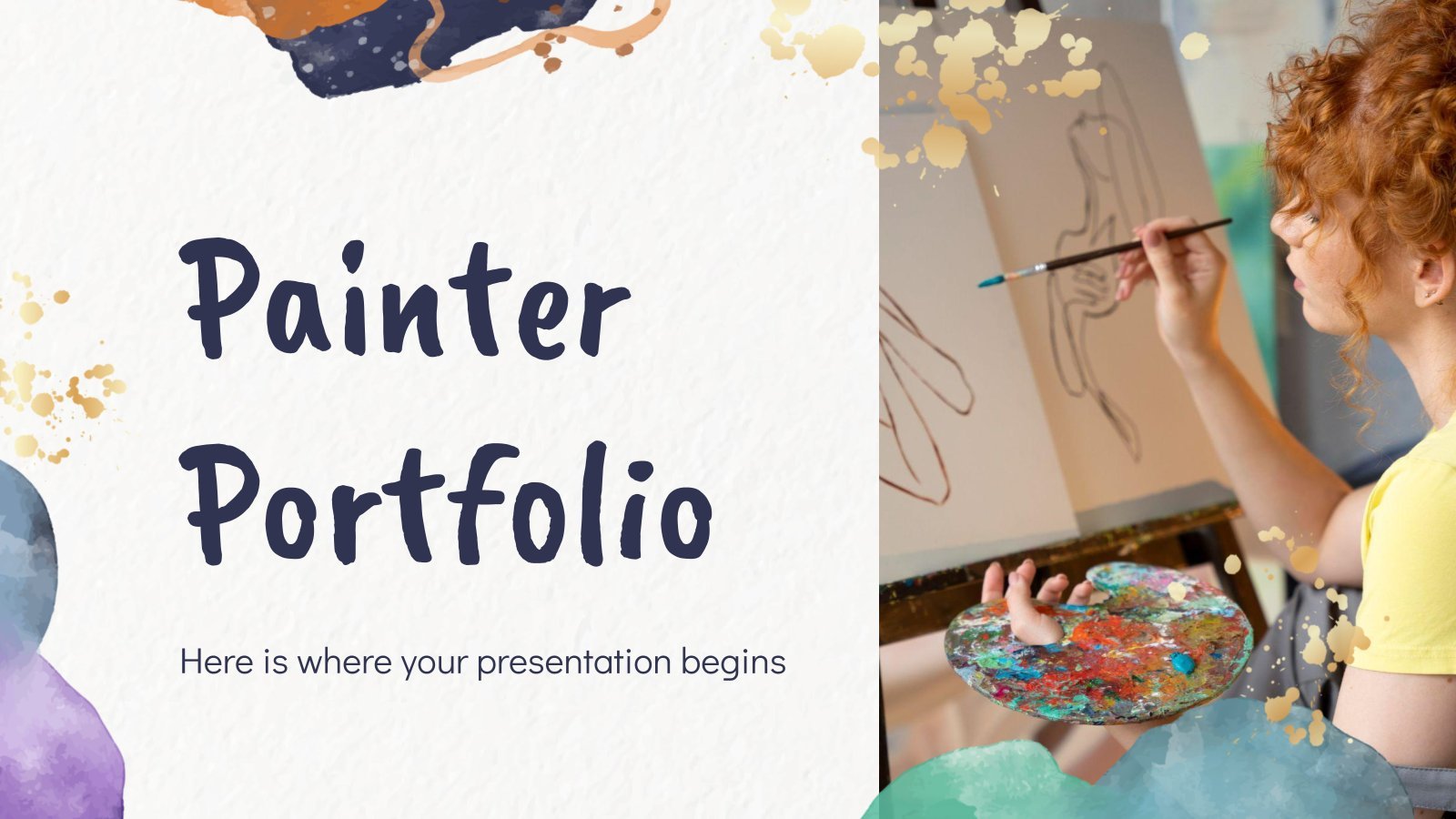
art portfolio
79 templates
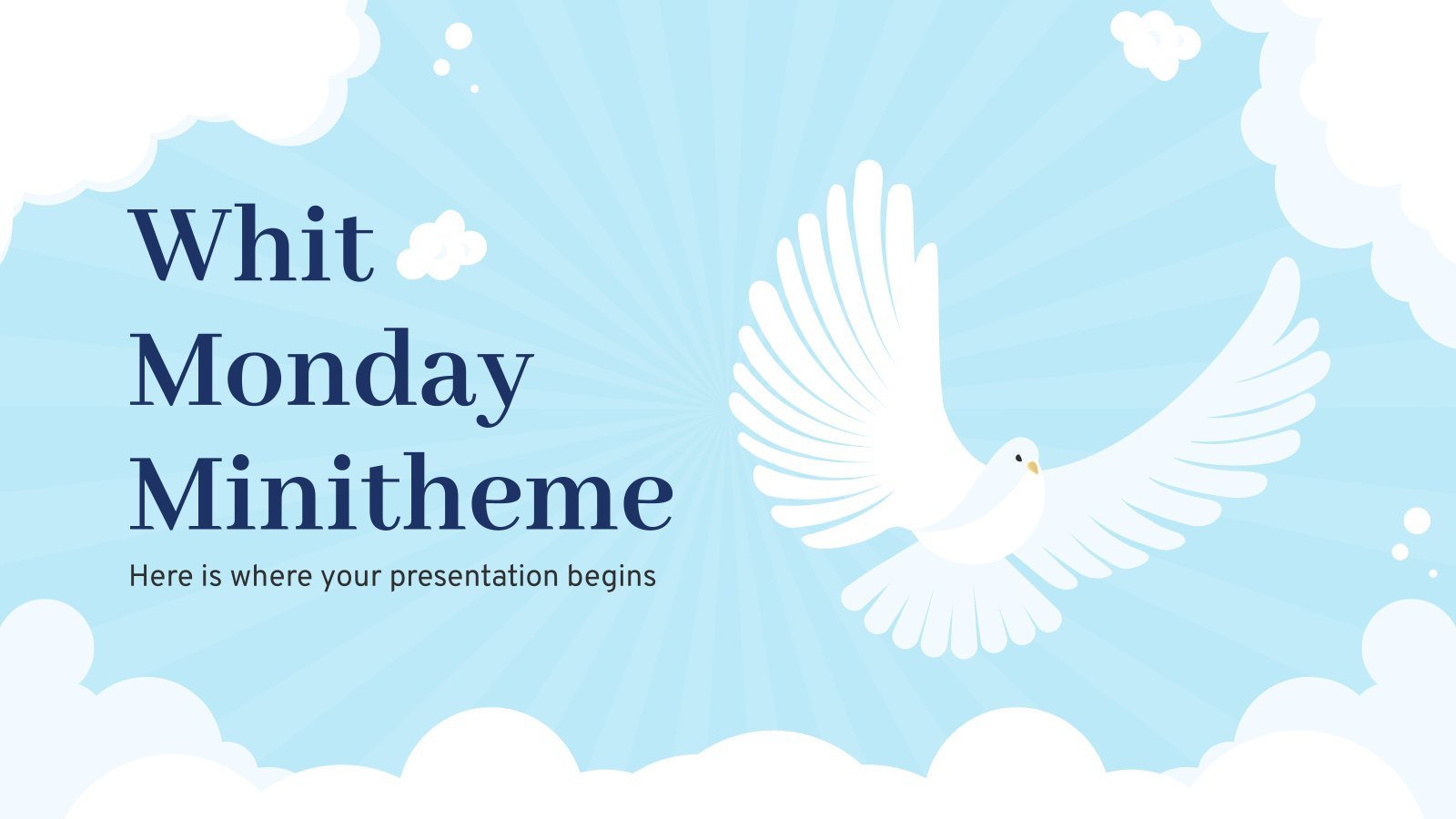
holy spirit
36 templates
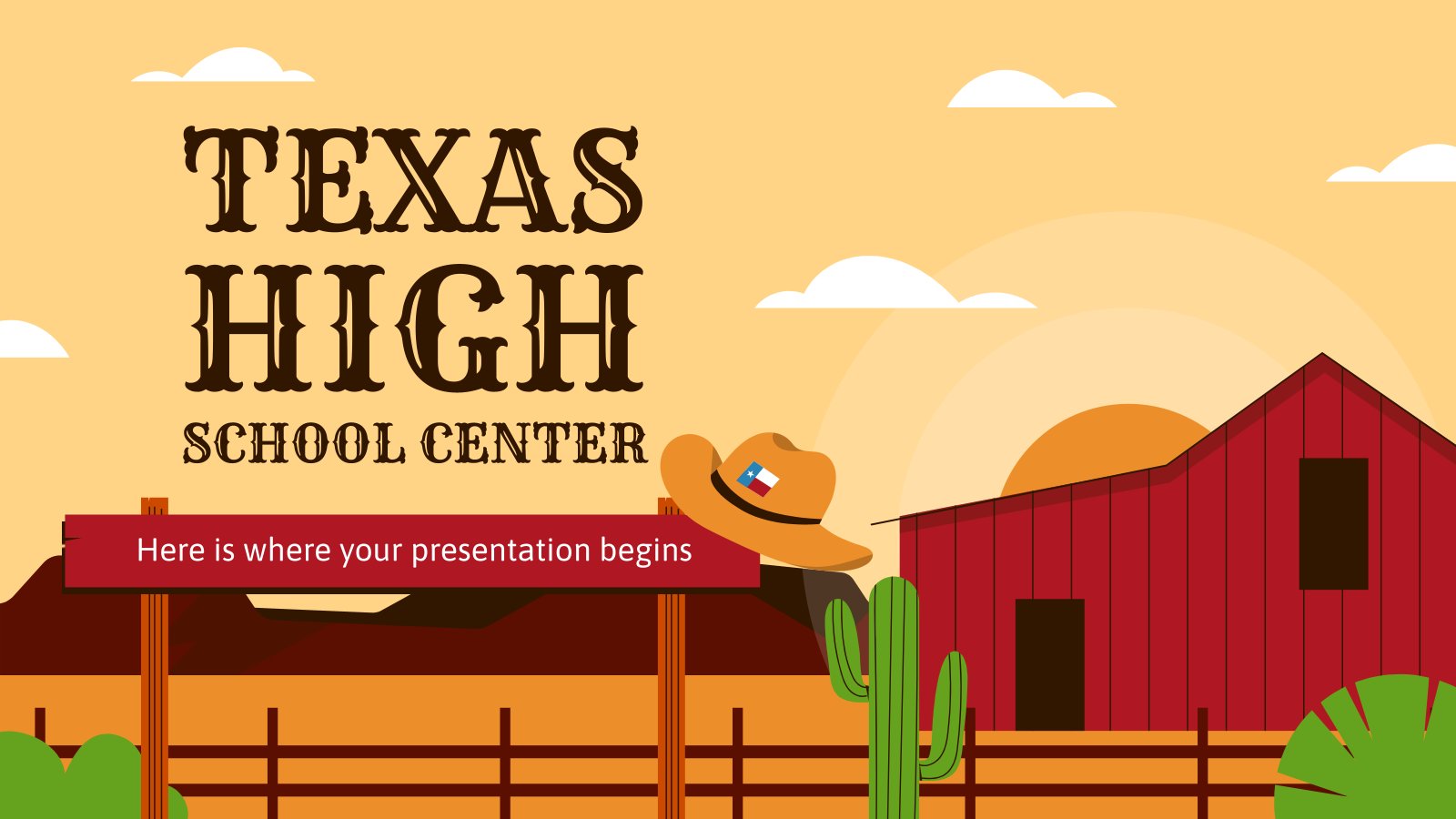
32 templates

human anatomy
18 templates
Wavy Book Report for Middle School
Wavy book report for middle school presentation, premium google slides theme, powerpoint template, and canva presentation template.
Book reports help your students develop their passion for reading, specially if they can prepare their own report with a creative template full of decorations and unique resources like this one. Let them choose their favorite book and share it with the class with this design for Google Slides and PowerPoint! The slides are full of colorful waves and pastel details to make it as beautiful as possible
Features of this template
- 100% editable and easy to modify
- 30 different slides to impress your audience
- Contains easy-to-edit graphics such as graphs, maps, tables, timelines and mockups
- Includes 500+ icons and Flaticon’s extension for customizing your slides
- Designed to be used in Google Slides, Canva, and Microsoft PowerPoint
- 16:9 widescreen format suitable for all types of screens
- Includes information about fonts, colors, and credits of the resources used
What are the benefits of having a Premium account?
What Premium plans do you have?
What can I do to have unlimited downloads?
Don’t want to attribute Slidesgo?
Gain access to over 24100 templates & presentations with premium from 1.67€/month.
Are you already Premium? Log in
Related posts on our blog

How to Add, Duplicate, Move, Delete or Hide Slides in Google Slides

How to Change Layouts in PowerPoint

How to Change the Slide Size in Google Slides
Related presentations.

Premium template
Unlock this template and gain unlimited access


IMAGES
VIDEO
COMMENTS
When you go to write your book report, be sure to include the information completed on the following pages. The final report must be typed and double spaced. Be sure to hand into your Reading teacher both this template and the book report when you return to school. Introductory paragraph - What is the name and author of the book on which you ...
A guide for middle school students to write book reports, covering the basics of what a book report is and is not, how to choose a book, how to read actively, and how to write the main body and conclusion of a report. Includes tips, resources, and sample rubrics for teachers and students.
This works well for upper elementary and middle school-aged children. But if you are looking for younger kids you will love our free 3rd grade book report template. When we get to high school years we will create a more detailed report. The sections of the book summary template are as follows: Story summary. The main characters.
What Is A Book Report. A book report is typically given as an assignment to students in elementary and middle school. Students fill out a form answering basic questions about the book they were assigned to read. Turning in the report serves as proof to the teacher that the student read the book and, hopefully, got something out of it.
2. Identify the main elements of the book. Scrutinize the book's primary components, including its main themes, characters, setting, and plot. These elements will form the basis of your report. 3. Formulate a thesis statement. Compose a thesis statement that encapsulates your personal perspective about the book.
This book report template is a timeline graphic organizer designed for 7th-grade or middle school students. It reinforces the skill of sequencing. Instead of flowing seamlessly from top to bottom, it zigzags from left to right and top to bottom utilizing transition words that help 7th-graders navigate the sequence.
The TeacherVision editorial team is comprised of teachers, experts, and content professionals dedicated to bringing you the most accurate and relevant information in the teaching space. View TeacherVision's profile. Assigning a book report? Print and share this set of book report elements, outlines, and examples with your students.
Use the 4 strategies and 2 resources in this packet to help your middle school students get more out of their reading and write better book reports. These strategies can be applied to any work of fiction, and the editable worksheets focus on collecting and organizing the most important plot and character information. Included in this resource are:
A well-designed book report template for kids allows room for personal expression while maintaining organization. Do book reports differ based on grade levels? Yes, they vary by grade level. Elementary reports focus on simple summaries and character descriptions. Middle school reports delve into themes and analysis.
Easily create a comprehensive outline for a middle school book report using our free template. Fill out the outlines online, customize it to your requirements, and save it as a PDF or Word document for printing or digital sharing.
A book report is an objective view of a specific book where you will be describing the general plotline without giving extensive details, analysis, or opinions of the student. It usually only states facts about the book's contents without the need to assess this content. On the other hand, a review is a subjective view.
Kids should restate the thesis (preferably in different terms than in the introduction), and reflect the introduction. Remind kids to also include a last sentence containing the essence of the report and book they read. They will use this at the end to craft a compelling title for their report. 6.
Middle School Book Report Page 1. Interesting Character. Pick the character you think is the most interesting. What attributes (characteristics) does this character possess that make that character especially interesting to you? Name at least three traits and give specific examples from the story of the character displaying each trait.
This printable book report template will help your late elementary and early middle school students with their book reports. We suggest this format for 5th, 6th, and 7th-grade students. Middle school students are likely reading larger chapter books with many characters, settings, and events.
Created by. Middle School Mood Swings. This book report template is a fun and creative way to inspire students to use thoughtful, critical analysis while reading Killing Mr. Griffin by Lois Duncan. The questions focus on significant details to ignite a deep, precise understanding of the text's meanings.
Following are free downloadable book report templates and examples that can be downloaded for free: Book Report Templates 01. Download. Book Report Templates 02. Download. Book Report Templates 03. Download. Book Report Templates 04. Download.
Middle School Biography Book Report Template. frostmiddleschool.org In middle school, students are encouraged to read storybooks and novels. This activity is followed by an assignment to prepare a book report amplifying certain aspects of the book in a few lines. Book reports help teachers' gauge a student's understanding after reading the ...
15. Watercolor Rainbow Book Report. This is great for biography research projects. Students cut out a photocopied image of their subject and glue it in the middle. Then, they draw lines from the image to the edges of the paper, like rays of sunshine, and fill in each section with information about the person.
Free Book Report Templates: Printables for Grades 3-5 for Fiction or Nonfiction Books. ... The Nocturnals are fun-filled animal adventure books with companion nonfiction for elementary school classrooms. Check out The Nocturnals World, a resource hub with free turnkey printable activities and educator guides, ...
Because students learn the story elements relatively early in their school life, this book report project template makes a great review activity. Using the template, students will identify the story's author, illustrator, characters, setting, problem, and solution. Download template. 4. Book Report Vocabulary Squares.
In elementary and middle school, book reports are given to the students as an assignment. It contains basic questions about the book that is assigned to the students to read. ... In conclusion, a book report template is helpful for the teachers and students because it cuts down some of the workloads. These templates are formatted academically ...
Premium Google Slides theme and PowerPoint template. Book reports help your students develop their passion for reading, specially if they can prepare their own report with a creative template full of decorations and unique resources like this one. Let them choose their favorite book and share it with the class with this design for Google Slides ...